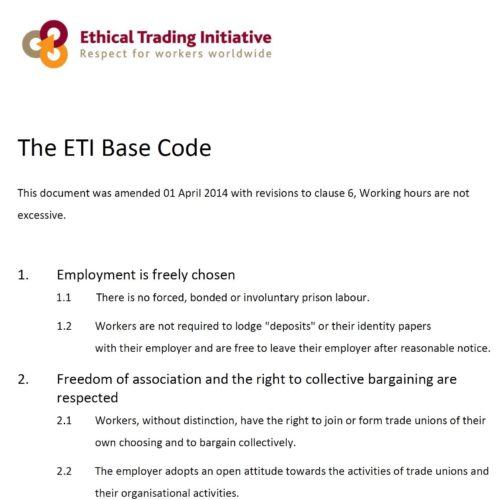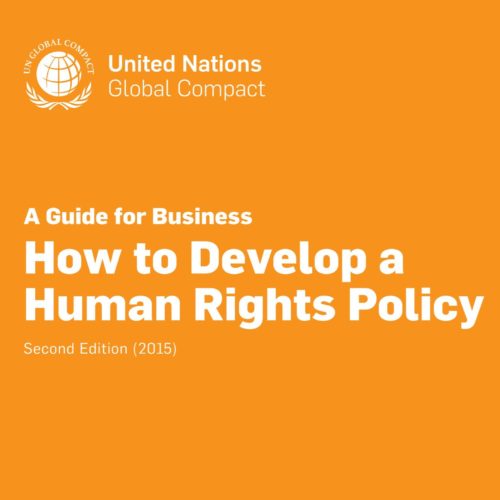-
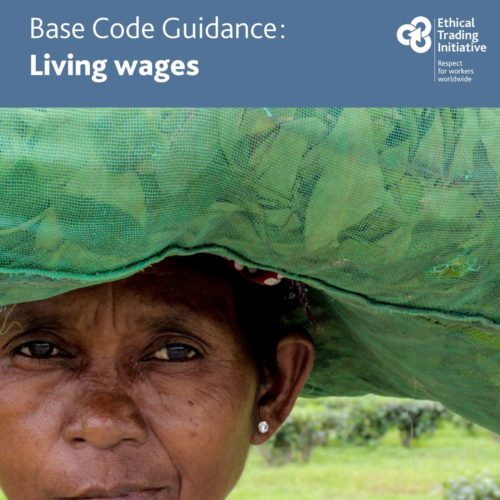 The Ethical Trading Initiative (ETI) is an alliance of companies, trade unions and NGOs that promotes workers' rights around the world. Through this guide, they share what companies can do to create the enabling conditions for the payment of living wages, in line with their commitment to the ETI Base Code. They outline their expectations of ETI members and provide guidance on winning senior executives’ support for living wages. The guidance includes practical steps for developing living wage strategies and collaborating with stakeholders to identify sustainable, scalable solutions. It also covers the vital question of how to offset the cost of increased wages, and includes the experience of ETI members.
The Ethical Trading Initiative (ETI) is an alliance of companies, trade unions and NGOs that promotes workers' rights around the world. Through this guide, they share what companies can do to create the enabling conditions for the payment of living wages, in line with their commitment to the ETI Base Code. They outline their expectations of ETI members and provide guidance on winning senior executives’ support for living wages. The guidance includes practical steps for developing living wage strategies and collaborating with stakeholders to identify sustainable, scalable solutions. It also covers the vital question of how to offset the cost of increased wages, and includes the experience of ETI members. -
 This report, published by the Chartered Institute of Building, calls for industry collaboration to eradicate modern slavery in supply chains, procurement and migrant labour. It offers many recommendations to companies within the industry which are also highly relevant to the hotel industry including guidance on supply chain mapping, corporate policy, training, navigating potential risks with third party agencies, and collaborating with NGOs and government.
This report, published by the Chartered Institute of Building, calls for industry collaboration to eradicate modern slavery in supply chains, procurement and migrant labour. It offers many recommendations to companies within the industry which are also highly relevant to the hotel industry including guidance on supply chain mapping, corporate policy, training, navigating potential risks with third party agencies, and collaborating with NGOs and government.Credit: Chartered Institute of Building (CIOB)
-
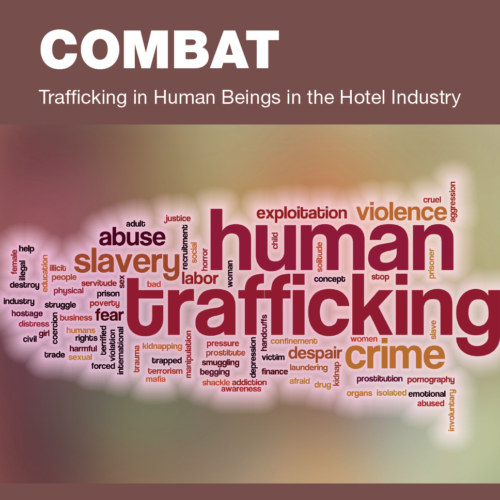 The COMBAT Toolkit is designed specifically to help hotels tackle the problem of human trafficking by helping staff to identify specific signs of trafficking. It comprises reference guides with accompanying powerpoints, case studies with accompanying powerpoint for training sessions, a trainer's manual, a series of 10-minute trainers, aide memoires and example awareness-raising posters. The following links to reference guides accompanied by slides consist of what different staff members should know about trafficking; it provides the background to human trafficking, and offers practical advice on the development of policies and procedures to counteract and disrupt trafficking and support victims. It offers trainers a ‘pick and mix’ approach so that they can tailor the contents to meet the needs of their training audience.
The COMBAT Toolkit is designed specifically to help hotels tackle the problem of human trafficking by helping staff to identify specific signs of trafficking. It comprises reference guides with accompanying powerpoints, case studies with accompanying powerpoint for training sessions, a trainer's manual, a series of 10-minute trainers, aide memoires and example awareness-raising posters. The following links to reference guides accompanied by slides consist of what different staff members should know about trafficking; it provides the background to human trafficking, and offers practical advice on the development of policies and procedures to counteract and disrupt trafficking and support victims. It offers trainers a ‘pick and mix’ approach so that they can tailor the contents to meet the needs of their training audience.Credit: COMBAT
For Hotel Management For Corporate Boards For Hotel Staff -
 The COMBAT Toolkit is designed specifically to help hotels tackle the problem of human trafficking by helping staff to identify specific signs of trafficking. It comprises reference guides with accompanying powerpoints, case studies with accompanying powerpoint for training sessions, a trainer's manual, a series of 10-minute trainers, aide memoires and example awareness-raising posters. This training manual provides an overview of the Toolkit, and is a supporting document providing guidance on setting training objectives according to participants' level of knowledge, and the time available to participants. With that in mind it emphasises the necessity to tailor your training plan accordingly with guidance on delivery (presentations and materials), questions and answers, group interaction and activities.
The COMBAT Toolkit is designed specifically to help hotels tackle the problem of human trafficking by helping staff to identify specific signs of trafficking. It comprises reference guides with accompanying powerpoints, case studies with accompanying powerpoint for training sessions, a trainer's manual, a series of 10-minute trainers, aide memoires and example awareness-raising posters. This training manual provides an overview of the Toolkit, and is a supporting document providing guidance on setting training objectives according to participants' level of knowledge, and the time available to participants. With that in mind it emphasises the necessity to tailor your training plan accordingly with guidance on delivery (presentations and materials), questions and answers, group interaction and activities.Credit: COMBAT
-
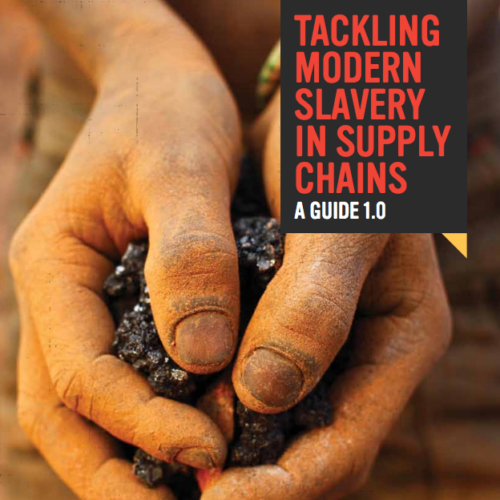 The Walk Free Foundation was established by Andrew Forrest, the Chairman of Fortescue Metals Group, after he found labour exploitation within his own supply chains and took a number of steps to prevent modern slavery affecting his business. This comprehensive guide considers corporate policy on modern slavery and provides both guidance and tools to implement it. It includes advice on corporate policy and provides template examples of a number of tools.
The Walk Free Foundation was established by Andrew Forrest, the Chairman of Fortescue Metals Group, after he found labour exploitation within his own supply chains and took a number of steps to prevent modern slavery affecting his business. This comprehensive guide considers corporate policy on modern slavery and provides both guidance and tools to implement it. It includes advice on corporate policy and provides template examples of a number of tools.Credit: Walk Free Foundation & Verite
-
 The Walk Free Foundation was established by Andrew Forrest, the Chairman of Fortescue Metals Group, after he found labour exploitation within his own supply chains and took a number of steps to prevent modern slavery affecting his business. This comprehensive guide considers corporate policy on modern slavery and provides both guidance and tools to implement it. It includes advice on corporate policy and provides template examples of a number of tools.
The Walk Free Foundation was established by Andrew Forrest, the Chairman of Fortescue Metals Group, after he found labour exploitation within his own supply chains and took a number of steps to prevent modern slavery affecting his business. This comprehensive guide considers corporate policy on modern slavery and provides both guidance and tools to implement it. It includes advice on corporate policy and provides template examples of a number of tools.Credit: Walk Free Foundation and Verite
-
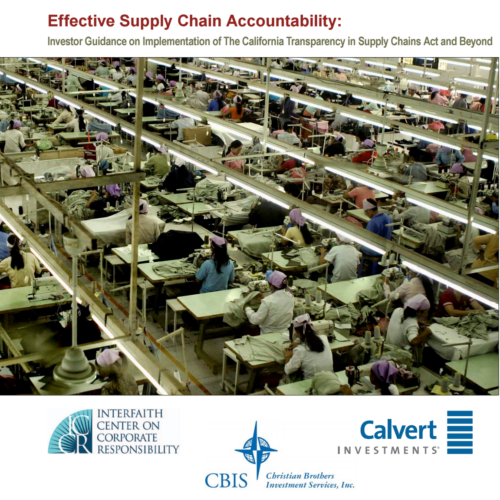 This guidance for investors outlines key steps relating to a company’s development of a specific anti-trafficking program, including elements the company should include in reports to demonstrate to stakeholders and shareholders that they are evaluating key risks in the supply chain and taking appropriate steps to address them. These include: - Develop and implement a human rights policy - Establish a human rights due diligence process - Conduct human rights risk assessments - Review, develop, and implement auditing, verification and traceability mechanisms - Train staff, suppliers, vendors, contractors, and auditors - Collaborate to expand efforts and influence - Produce a robust and substantive annual report
This guidance for investors outlines key steps relating to a company’s development of a specific anti-trafficking program, including elements the company should include in reports to demonstrate to stakeholders and shareholders that they are evaluating key risks in the supply chain and taking appropriate steps to address them. These include: - Develop and implement a human rights policy - Establish a human rights due diligence process - Conduct human rights risk assessments - Review, develop, and implement auditing, verification and traceability mechanisms - Train staff, suppliers, vendors, contractors, and auditors - Collaborate to expand efforts and influence - Produce a robust and substantive annual reportCredit: Interfaith Centre on Corporate Responsibility; Christian Brothers Investment Services; Calvert Investments.
-
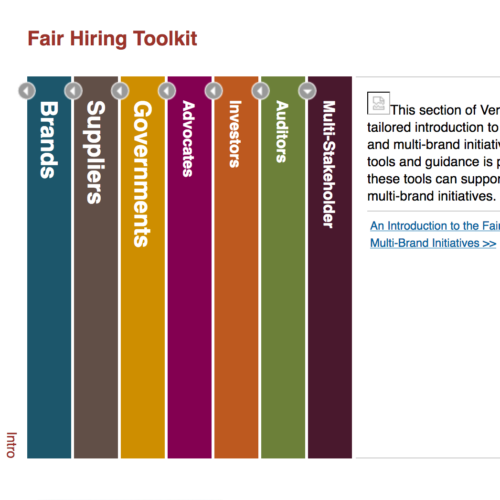 The Fair Hiring Toolkit is a resource which addresses fair hiring practice and responsible recruitment of migrant workers in global supply chains. It focuses on all levels of an organisation to tailor tools and advice appropriately and is a step-by-step process of how to implement trafficking-free supply chains. This includes providing a Framework for Action for brands and suppliers, and supplying guidance for governments, advocates, investors, auditors and other stakeholders. The Frameworks offer advice on: - Improving Codes of Conduct - Raising awareness and building capacity - Strengthening assessments and social audits - Taking corrective action & developing systems improvement plans - Reporting and transparency - Engagement with other actors - Public policy
The Fair Hiring Toolkit is a resource which addresses fair hiring practice and responsible recruitment of migrant workers in global supply chains. It focuses on all levels of an organisation to tailor tools and advice appropriately and is a step-by-step process of how to implement trafficking-free supply chains. This includes providing a Framework for Action for brands and suppliers, and supplying guidance for governments, advocates, investors, auditors and other stakeholders. The Frameworks offer advice on: - Improving Codes of Conduct - Raising awareness and building capacity - Strengthening assessments and social audits - Taking corrective action & developing systems improvement plans - Reporting and transparency - Engagement with other actors - Public policyCredit: Verite
-
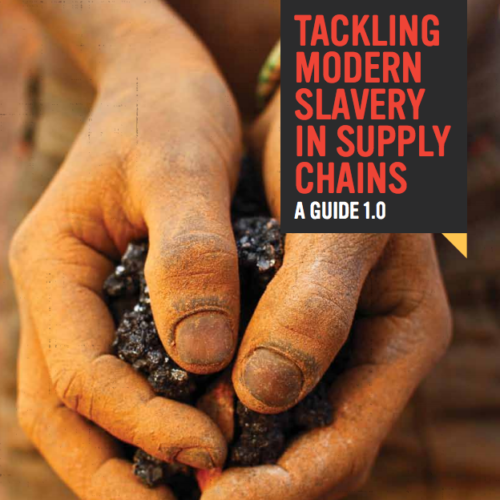 The Walk Free Foundation was established by Andrew Forrest, the Chairman of Fortescue Metals Group, after he found labour exploitation within his own supply chains and took a number of steps to prevent modern slavery affecting his business. This comprehensive guide considers corporate policy on modern slavery and provides both guidance and tools to implement it. It includes advice on corporate policy and provides template examples of a number of tools.
The Walk Free Foundation was established by Andrew Forrest, the Chairman of Fortescue Metals Group, after he found labour exploitation within his own supply chains and took a number of steps to prevent modern slavery affecting his business. This comprehensive guide considers corporate policy on modern slavery and provides both guidance and tools to implement it. It includes advice on corporate policy and provides template examples of a number of tools.Credit: Walk Free Foundation & Verite
-
 Hedging Risk by Combating Human Trafficking: Insights from the Private Sector is designed to help companies share best practices so they can mitigate their risks and help eliminate this heinous practice. In this first of a series, we highlight insights and technology-driven interventions in the hospitality, finance, and transportation industries.
Hedging Risk by Combating Human Trafficking: Insights from the Private Sector is designed to help companies share best practices so they can mitigate their risks and help eliminate this heinous practice. In this first of a series, we highlight insights and technology-driven interventions in the hospitality, finance, and transportation industries.Credit: World Economic Forum
-
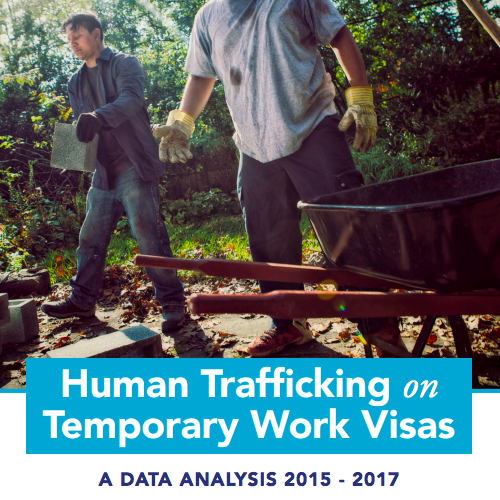 This report highlights the destructive practice of labour trafficking on temporary work visas, how the system is flawed, and the steps needed to fix it. From 2015-2017, Polaris collected data on the US temporary work visa system and identified some 800 victims of human trafficking who held temporary work visas at the time of their abuse.
This report highlights the destructive practice of labour trafficking on temporary work visas, how the system is flawed, and the steps needed to fix it. From 2015-2017, Polaris collected data on the US temporary work visa system and identified some 800 victims of human trafficking who held temporary work visas at the time of their abuse.Credit: Polaris
-
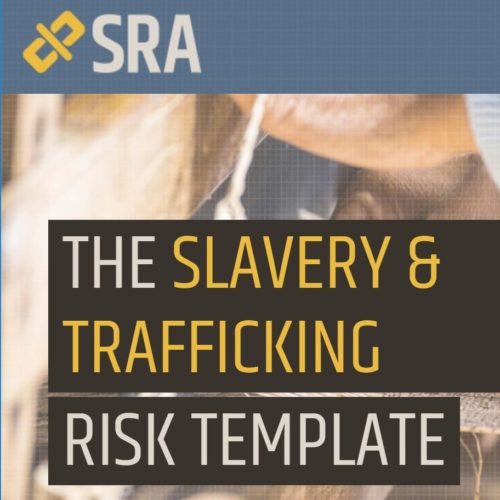 The Slavery and Human Trafficking Risk Template (STRT) is a free, open-source data collection template that forms the backbone of corporate modern slavery due diligence programs. It is maintained by a Development Committee committed to ensuring it keeps stride with new research and evolving industry needs. It is housed under the Social Responsibility Alliance, an initiative dedicated to providing companies with the open-source data collection tools they need to build socially responsible supply chains.
The Slavery and Human Trafficking Risk Template (STRT) is a free, open-source data collection template that forms the backbone of corporate modern slavery due diligence programs. It is maintained by a Development Committee committed to ensuring it keeps stride with new research and evolving industry needs. It is housed under the Social Responsibility Alliance, an initiative dedicated to providing companies with the open-source data collection tools they need to build socially responsible supply chains.Credit: Social Responsibility Alliance
-
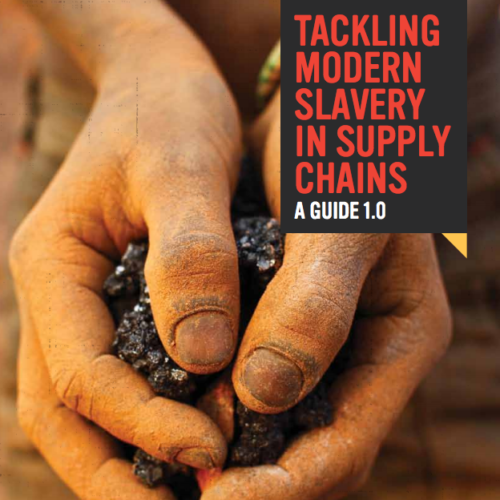 The Walk Free Foundation was established by Andrew Forrest, the Chairman of Fortescue Metals Group, after he found labour exploitation within his own supply chains and took a number of steps to prevent modern slavery affecting his business. This comprehensive guide considers corporate policy on modern slavery and provides both guidance and tools to implement it. It includes advice on corporate policy and provides template examples of a number of tools.
The Walk Free Foundation was established by Andrew Forrest, the Chairman of Fortescue Metals Group, after he found labour exploitation within his own supply chains and took a number of steps to prevent modern slavery affecting his business. This comprehensive guide considers corporate policy on modern slavery and provides both guidance and tools to implement it. It includes advice on corporate policy and provides template examples of a number of tools.Credit: Walk Free Foundation & Verite
-
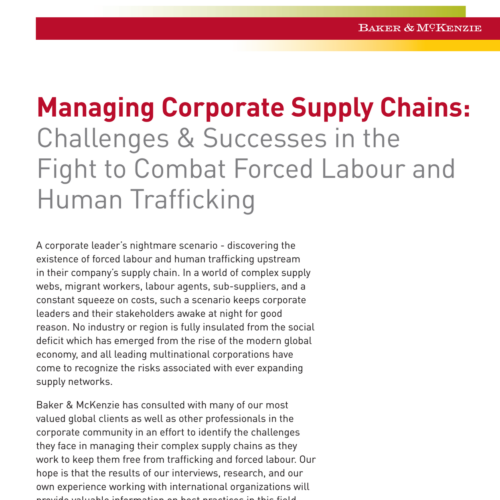 This guide is published by a law firm with expertise providing modern slavery related advice to business. It gives a good overview of the scope of the problem of trafficking in supply chains, and what existing support there is for business. It looks at the legal mechanisms already in place to protect against modern slavery in corporate supply chains, as well as the successes and challenges of corporate initiatives, and solutions to the problem.
This guide is published by a law firm with expertise providing modern slavery related advice to business. It gives a good overview of the scope of the problem of trafficking in supply chains, and what existing support there is for business. It looks at the legal mechanisms already in place to protect against modern slavery in corporate supply chains, as well as the successes and challenges of corporate initiatives, and solutions to the problem.Credit: Baker McKenzie
-
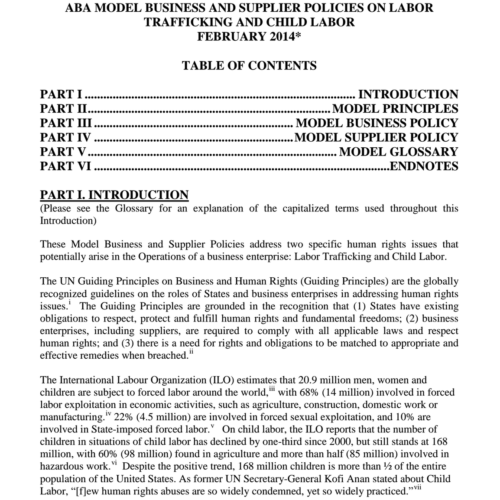 These model principles are intended for both businesses and suppliers that do not currently have policies relating to labour trafficking and child labour, and for those that do but want to adapt them to reflect evolving practices. Included are examples of model policies and principles that can be incoporated into codes of conduct or current business policies.
These model principles are intended for both businesses and suppliers that do not currently have policies relating to labour trafficking and child labour, and for those that do but want to adapt them to reflect evolving practices. Included are examples of model policies and principles that can be incoporated into codes of conduct or current business policies.Credit: American Bar Association
-
 Stronger Together is a multi-stakeholder initiative which aims to reduce modern slavery. It provides guidance, training and resources to organisations, employers, labour providers, workers and their representatives. This free collection of resources includes pragmatic guidance and toolkits, and resources for the workplace including multilingual posters, leaflets and template policies. These seven principles have been agreed upon by the supermarket businesses sponsored by Stronger Together. The list includes "common principles" for the businesses' supply chains partners to follow when completing modern slavery statements.
Stronger Together is a multi-stakeholder initiative which aims to reduce modern slavery. It provides guidance, training and resources to organisations, employers, labour providers, workers and their representatives. This free collection of resources includes pragmatic guidance and toolkits, and resources for the workplace including multilingual posters, leaflets and template policies. These seven principles have been agreed upon by the supermarket businesses sponsored by Stronger Together. The list includes "common principles" for the businesses' supply chains partners to follow when completing modern slavery statements.Credit: Stronger Together
-
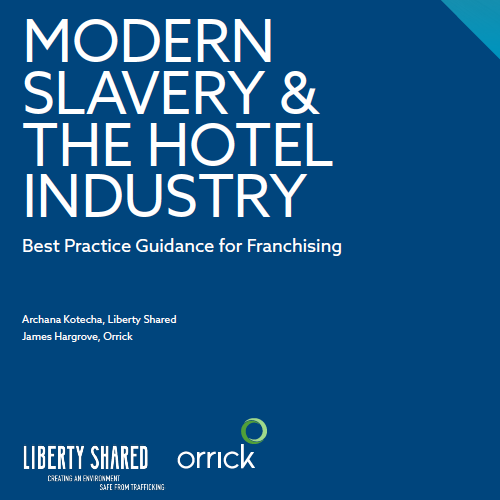 This guide, drafted by Liberty Shared, recognises the risks the hotel industry, and in particular hotels operating under major international brand franchises, face in regards to human rights abuses. This guide provides franchisors with an overview of the risks associated with modern slavery in relation to hotel franchise agreements and sets out practical solutions aimed at increasing the prospect that a franchisee's operations are free from these risks. Liberty Shared aims to prevent human trafficking through legal advocacy, technological interventions, and strategic collaborations with NGOs and corporations in Asia and globally.
This guide, drafted by Liberty Shared, recognises the risks the hotel industry, and in particular hotels operating under major international brand franchises, face in regards to human rights abuses. This guide provides franchisors with an overview of the risks associated with modern slavery in relation to hotel franchise agreements and sets out practical solutions aimed at increasing the prospect that a franchisee's operations are free from these risks. Liberty Shared aims to prevent human trafficking through legal advocacy, technological interventions, and strategic collaborations with NGOs and corporations in Asia and globally.Credit: Liberty Shared
-
 This is an analysis of modern slavery statements that focuses on changes in reporting and practice in addressing forced labour and human trafficking. It covers 150 sample companies across different sectors. It seeks to understand the quality and scope of reporting against the UK Modern Slavery Act’s transparency requirements set out in s. 54 as well as the accompanying guidance on recommended content published by the Home Office.
This is an analysis of modern slavery statements that focuses on changes in reporting and practice in addressing forced labour and human trafficking. It covers 150 sample companies across different sectors. It seeks to understand the quality and scope of reporting against the UK Modern Slavery Act’s transparency requirements set out in s. 54 as well as the accompanying guidance on recommended content published by the Home Office.Credit: Ergon Associates
-
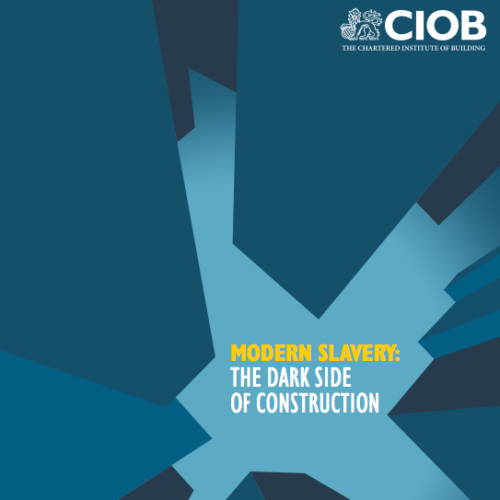 The Chartered Institute of Building published this report to shed light on exploitation within the construction industry. The report looks at labour exploitation all over the world considering the different types of exploitation in the industry, and offering recommendations to develop effective frameworks that will help protect human rights in the industry.
The Chartered Institute of Building published this report to shed light on exploitation within the construction industry. The report looks at labour exploitation all over the world considering the different types of exploitation in the industry, and offering recommendations to develop effective frameworks that will help protect human rights in the industry.Credit: Chartered Institute of Building (CIOB)
-
 Stronger Together is a multi-stakeholder initiative which aims to reduce modern slavery. It provides guidance, training and resources to organisations, employers, labour providers, workers and their representatives. This free collection of resources includes pragmatic guidance and toolkits, and resources for the workplace including multilingual posters, leaflets and template policies. This template is to be modified as required and for inclusion with a wider Tackling Modern Slavery in Business and Supply Chain or Business Human Rights Policy.
Stronger Together is a multi-stakeholder initiative which aims to reduce modern slavery. It provides guidance, training and resources to organisations, employers, labour providers, workers and their representatives. This free collection of resources includes pragmatic guidance and toolkits, and resources for the workplace including multilingual posters, leaflets and template policies. This template is to be modified as required and for inclusion with a wider Tackling Modern Slavery in Business and Supply Chain or Business Human Rights Policy.Credit: Stronger Together
-
 Stronger Together is a multi-stakeholder initiative which aims to reduce modern slavery. It provides guidance, training and resources to organisations, employers, labour providers, workers and their representatives. This free collection of resources includes pragmatic guidance and toolkits, and resources for the workplace including multilingual posters, leaflets and template policies. This template is to be modified as required and for inclusion with a wider Tackling Modern Slavery in Business and Supply Chain or Business Human Rights Policy.
Stronger Together is a multi-stakeholder initiative which aims to reduce modern slavery. It provides guidance, training and resources to organisations, employers, labour providers, workers and their representatives. This free collection of resources includes pragmatic guidance and toolkits, and resources for the workplace including multilingual posters, leaflets and template policies. This template is to be modified as required and for inclusion with a wider Tackling Modern Slavery in Business and Supply Chain or Business Human Rights Policy.Credit: Stronger Together
-
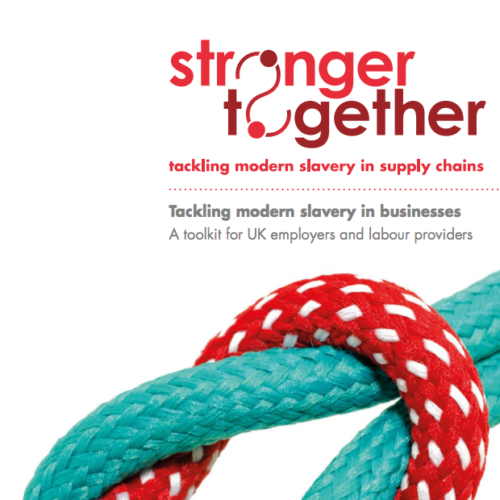 Stronger Together is a multi-stakeholder initiative which aims to reduce modern slavery. It provides guidance, training and resources to organisations, employers, labour providers, workers and their representatives. This free collection of resources includes pragmatic guidance and toolkits, and resources for the workplace including multilingual posters, leaflets and template policies. This template is to be modified as required and for inclusion with a wider Tackling Modern Slavery in Business and Supply Chain or Business Human Rights Policy.
Stronger Together is a multi-stakeholder initiative which aims to reduce modern slavery. It provides guidance, training and resources to organisations, employers, labour providers, workers and their representatives. This free collection of resources includes pragmatic guidance and toolkits, and resources for the workplace including multilingual posters, leaflets and template policies. This template is to be modified as required and for inclusion with a wider Tackling Modern Slavery in Business and Supply Chain or Business Human Rights Policy.Credit: Stronger Together
-
 Stronger Together is a multi-stakeholder initiative which aims to reduce modern slavery. It provides guidance, training and resources to organisations, employers, labour providers, workers and their representatives. This free collection of resources includes pragmatic guidance and toolkits, and resources for the workplace including multilingual posters, leaflets and template policies. This template is to be modified as required and for inclusion with a wider Tackling Modern Slavery in Business and Supply Chain or Business Human Rights Policy.
Stronger Together is a multi-stakeholder initiative which aims to reduce modern slavery. It provides guidance, training and resources to organisations, employers, labour providers, workers and their representatives. This free collection of resources includes pragmatic guidance and toolkits, and resources for the workplace including multilingual posters, leaflets and template policies. This template is to be modified as required and for inclusion with a wider Tackling Modern Slavery in Business and Supply Chain or Business Human Rights Policy.Credit: Stronger Together
-
 The Walk Free Foundation was established by Andrew Forrest, the Chairman of Fortescue Metals Group, after he found labour exploitation within his own supply chains and took a number of steps to prevent modern slavery affecting his business. This comprehensive guide considers corporate policy on modern slavery and provides both guidance and tools to implement it. It includes advice on corporate policy and provides template examples of a number of tools.
The Walk Free Foundation was established by Andrew Forrest, the Chairman of Fortescue Metals Group, after he found labour exploitation within his own supply chains and took a number of steps to prevent modern slavery affecting his business. This comprehensive guide considers corporate policy on modern slavery and provides both guidance and tools to implement it. It includes advice on corporate policy and provides template examples of a number of tools.Credit: Walk Free Foundation & Verite
-
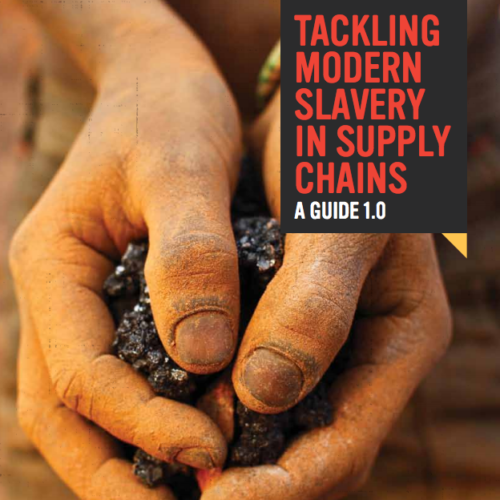 The Walk Free Foundation was established by Andrew Forrest, the Chairman of Fortescue Metals Group, after he found labour exploitation within his own supply chains and took a number of steps to prevent modern slavery affecting his business. This comprehensive guide considers corporate policy on modern slavery and provides both guidance and tools to implement it. It includes advice on corporate policy and provides template examples of a number of tools.
The Walk Free Foundation was established by Andrew Forrest, the Chairman of Fortescue Metals Group, after he found labour exploitation within his own supply chains and took a number of steps to prevent modern slavery affecting his business. This comprehensive guide considers corporate policy on modern slavery and provides both guidance and tools to implement it. It includes advice on corporate policy and provides template examples of a number of tools.Credit: Walk Free & Verite
-
 Stronger Together is a multi-stakeholder initiative which aims to reduce modern slavery. It provides guidance, training and resources to organisations, employers, labour providers, workers and their representatives. This free collection of resources includes pragmatic guidance and toolkits, and resources for the workplace including multilingual posters, leaflets and template policies. This template is to be modified as required and for inclusion with a wider Tackling Modern Slavery in Business and Supply Chain or Business Human Rights Policy.
Stronger Together is a multi-stakeholder initiative which aims to reduce modern slavery. It provides guidance, training and resources to organisations, employers, labour providers, workers and their representatives. This free collection of resources includes pragmatic guidance and toolkits, and resources for the workplace including multilingual posters, leaflets and template policies. This template is to be modified as required and for inclusion with a wider Tackling Modern Slavery in Business and Supply Chain or Business Human Rights Policy.Credit: Stronger Together
-
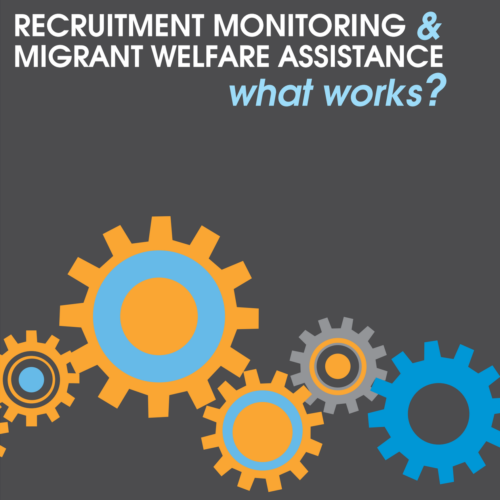 The IOM is a UN organisation providing advice and services to governments and migrants. This report focuses on the migrant welfare assistance currently offered to members of the Colombo Process group in countries of destination. It reviews provisions currently in place to prevent abusive recruitment practices and includes a proposed framework for measuring the effectiveness of recruitment monitoring.
The IOM is a UN organisation providing advice and services to governments and migrants. This report focuses on the migrant welfare assistance currently offered to members of the Colombo Process group in countries of destination. It reviews provisions currently in place to prevent abusive recruitment practices and includes a proposed framework for measuring the effectiveness of recruitment monitoring.Credit: International Organisation for Migration (IOM)
-
 The Walkfree Foundation was established by Andrew Forrest, the Chairman of Fortescue Metals Group, after he found labour exploitation within his own supply chains and took a number of steps to prevent modern slavery affecting his business. This comprehensive guide considers corporate policy on modern slavery and provides both guidance and tools to implement it. It includes advice on corporate policy and provides template examples of a number of tools. Credit: Walkfree Foundation & Verite
The Walkfree Foundation was established by Andrew Forrest, the Chairman of Fortescue Metals Group, after he found labour exploitation within his own supply chains and took a number of steps to prevent modern slavery affecting his business. This comprehensive guide considers corporate policy on modern slavery and provides both guidance and tools to implement it. It includes advice on corporate policy and provides template examples of a number of tools. Credit: Walkfree Foundation & Verite -
 The Walk Free Foundation was established by Andrew Forrest, the Chairman of Fortescue Metals Group, after he found labour exploitation within his own supply chains and took a number of steps to prevent modern slavery affecting his business. This comprehensive guide considers corporate policy on modern slavery and provides both guidance and tools to implement it. It includes advice on corporate policy and provides template examples of a number of tools.
The Walk Free Foundation was established by Andrew Forrest, the Chairman of Fortescue Metals Group, after he found labour exploitation within his own supply chains and took a number of steps to prevent modern slavery affecting his business. This comprehensive guide considers corporate policy on modern slavery and provides both guidance and tools to implement it. It includes advice on corporate policy and provides template examples of a number of tools.Credit: Walk Free Foundation & Verite
-
 The Walkfree Foundation was established by Andrew Forrest, the Chairman of Fortescue Metals Group, after he found labour exploitation within his own supply chains and took a number of steps to prevent modern slavery affecting his business. This comprehensive guide considers corporate policy on modern slavery and provides both guidance and tools to implement it. It includes advice on corporate policy and provides template examples of a number of tools. Credit: Walkfree Foundation & Verite
The Walkfree Foundation was established by Andrew Forrest, the Chairman of Fortescue Metals Group, after he found labour exploitation within his own supply chains and took a number of steps to prevent modern slavery affecting his business. This comprehensive guide considers corporate policy on modern slavery and provides both guidance and tools to implement it. It includes advice on corporate policy and provides template examples of a number of tools. Credit: Walkfree Foundation & Verite -
 The Leadership Group for Responsible Recruitment calls for the implementation of the Employer Pays Principle which requires companies to commit to bearing the costs of recruitment. This short guide breaks down six steps companies should take to meet the commitment in practice.
The Leadership Group for Responsible Recruitment calls for the implementation of the Employer Pays Principle which requires companies to commit to bearing the costs of recruitment. This short guide breaks down six steps companies should take to meet the commitment in practice.Credit: Leadership Group for Responsible Recruitment
-
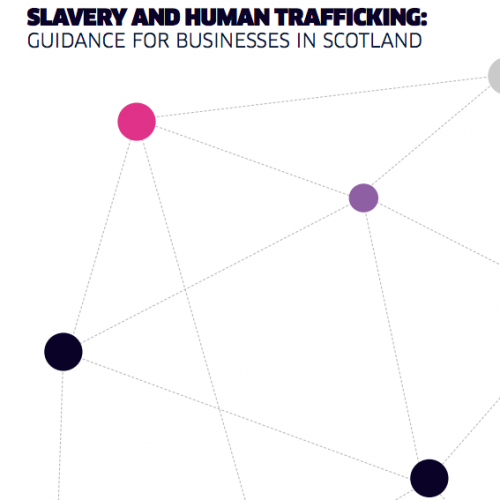 This guide provides tailored advice for all businesses in Scotland in relation to human trafficking, exploitation and every business’s legal and ethical duty. Part one is relevant to all businesses; part two contains advice for businesses with an annual turnover of £36 million or more; part three contains advice for businesses with an annual turnover below £36 million.
This guide provides tailored advice for all businesses in Scotland in relation to human trafficking, exploitation and every business’s legal and ethical duty. Part one is relevant to all businesses; part two contains advice for businesses with an annual turnover of £36 million or more; part three contains advice for businesses with an annual turnover below £36 million.Credit: Scottish Government
-
 Stronger Together is a multi-stakeholder initiative which aims to reduce modern slavery. It provides guidance, training and resources to organisations, employers, labour providers, workers and their representatives. This free collection of resources includes pragmatic guidance and toolkits, and resources for the workplace including multilingual posters, leaflets and template policies.
Stronger Together is a multi-stakeholder initiative which aims to reduce modern slavery. It provides guidance, training and resources to organisations, employers, labour providers, workers and their representatives. This free collection of resources includes pragmatic guidance and toolkits, and resources for the workplace including multilingual posters, leaflets and template policies.Credit: Stronger Together
-
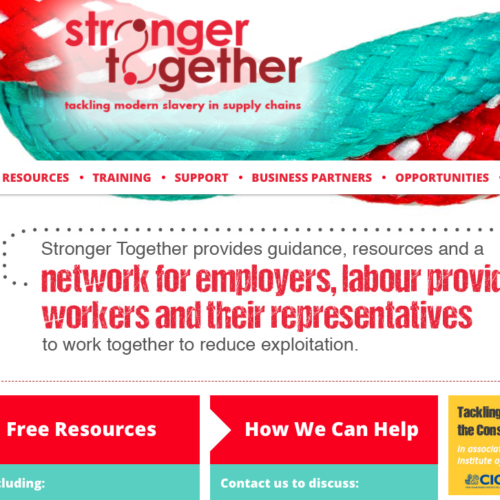 Stronger Together is a multi-stakeholder initiative which aims to reduce modern slavery. It provides guidance, training and resources to organisations, employers, labour providers, workers and their representatives. This free collection of resources includes pragmatic guidance and toolkits, and resources for the workplace including multilingual posters, leaflets and template policies.
Stronger Together is a multi-stakeholder initiative which aims to reduce modern slavery. It provides guidance, training and resources to organisations, employers, labour providers, workers and their representatives. This free collection of resources includes pragmatic guidance and toolkits, and resources for the workplace including multilingual posters, leaflets and template policies.Credit: Stronger Together
-
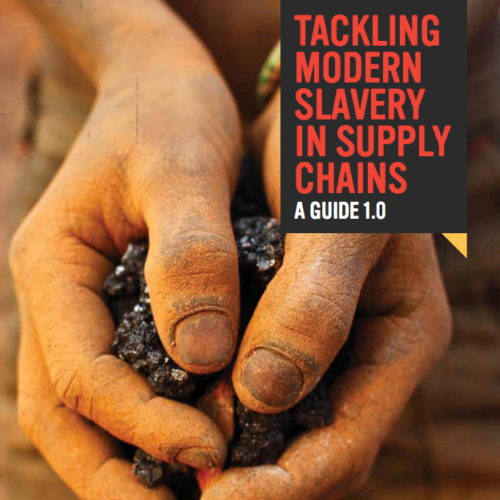 The Walk Free Foundation was established by Andrew Forrest, the Chairman of Fortescue Metals Group, after he found labour exploitation within his own supply chains and took a number of steps to prevent modern slavery affecting his business. This comprehensive guide considers corporate policy on modern slavery and provides both guidance and tools to implement it. It includes advice on corporate policy and provides template examples of a number of tools.
The Walk Free Foundation was established by Andrew Forrest, the Chairman of Fortescue Metals Group, after he found labour exploitation within his own supply chains and took a number of steps to prevent modern slavery affecting his business. This comprehensive guide considers corporate policy on modern slavery and provides both guidance and tools to implement it. It includes advice on corporate policy and provides template examples of a number of tools.Credit: Walk Free Foundation & Verite
-
 Stronger Together is a multi-stakeholder initiative which aims to reduce modern slavery. It provides guidance, training and resources to organisations, employers, labour providers, workers and their representatives. This free collection of resources includes pragmatic guidance and toolkits, and resources for the workplace including multilingual posters, leaflets and template policies. This toolkit gives an overview of Stronger Together's purpose, providing guidance on best practice for UK employers and labour providers on uncovering, preventing and reporting potential cases of modern slavery within their own business and supply chains. It defines modern slavery and forced labour in supply chains and third party agencies, and gives information on the processes of reporting modern slavery and supporting potential victims. It includes templates for policies and procedures, which can be found separately on this resource hub.
Stronger Together is a multi-stakeholder initiative which aims to reduce modern slavery. It provides guidance, training and resources to organisations, employers, labour providers, workers and their representatives. This free collection of resources includes pragmatic guidance and toolkits, and resources for the workplace including multilingual posters, leaflets and template policies. This toolkit gives an overview of Stronger Together's purpose, providing guidance on best practice for UK employers and labour providers on uncovering, preventing and reporting potential cases of modern slavery within their own business and supply chains. It defines modern slavery and forced labour in supply chains and third party agencies, and gives information on the processes of reporting modern slavery and supporting potential victims. It includes templates for policies and procedures, which can be found separately on this resource hub.Credit: Stronger Together
-
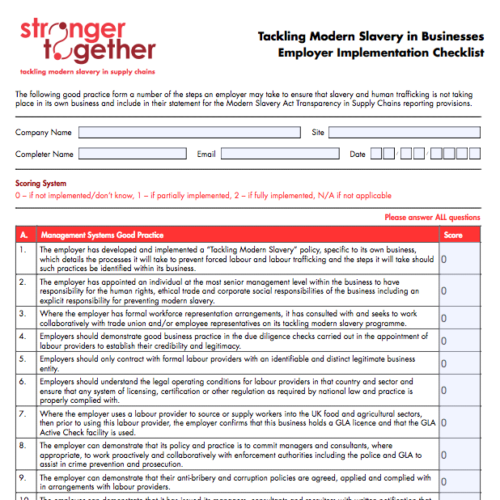 Stronger Together is a multi-stakeholder initiative which aims to reduce modern slavery. It provides guidance, training and resources to organisations, employers, labour providers, workers and their representatives. This free collection of resources includes pragmatic guidance and toolkits, and resources for the workplace including multilingual posters, leaflets and template policies. This is a good practice checklist that can be used by employers to ensure modern slavery and human trafficking is not happening in any area of their own business, and to include in their statement for the Modern Slavery Act Transparency in Supply Chains reporting provisions. It splits up the checklist into: management systems , training to build capacity and capability, labour sourcing, recruitment processes, worker records analysis to alert risks, workplace monitoring, worker engagement, providing access to remedy.
Stronger Together is a multi-stakeholder initiative which aims to reduce modern slavery. It provides guidance, training and resources to organisations, employers, labour providers, workers and their representatives. This free collection of resources includes pragmatic guidance and toolkits, and resources for the workplace including multilingual posters, leaflets and template policies. This is a good practice checklist that can be used by employers to ensure modern slavery and human trafficking is not happening in any area of their own business, and to include in their statement for the Modern Slavery Act Transparency in Supply Chains reporting provisions. It splits up the checklist into: management systems , training to build capacity and capability, labour sourcing, recruitment processes, worker records analysis to alert risks, workplace monitoring, worker engagement, providing access to remedy.Credit: Stronger Together
-
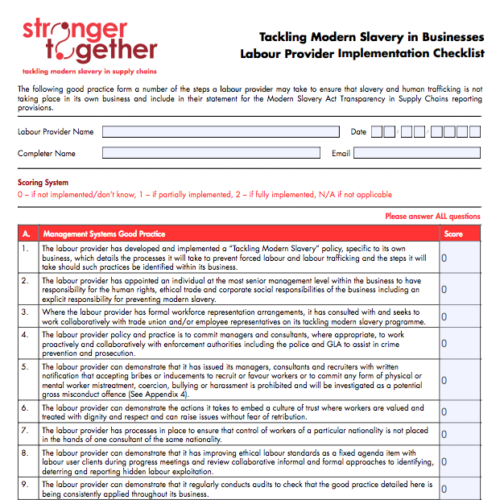 Stronger Together is a multi-stakeholder initiative which aims to reduce modern slavery. It provides guidance, training and resources to organisations, employers, labour providers, workers and their representatives. This free collection of resources includes pragmatic guidance and toolkits, and resources for the workplace including multilingual posters, leaflets and template policies. This is a good practice checklist that can be used by labour providers to ensure modern slavery and human trafficking is not happening in any area of their own business, and to include in their statement for the Modern Slavery Act Transparency in Supply Chains reporting provisions. It splits up the checklist into: management systems, training to build capacity and capability, labour sourcing, recruitment processes, worker records analysis to alert risks, worker allocation, workplace monitoring, worker engagement, providing access to remedy.
Stronger Together is a multi-stakeholder initiative which aims to reduce modern slavery. It provides guidance, training and resources to organisations, employers, labour providers, workers and their representatives. This free collection of resources includes pragmatic guidance and toolkits, and resources for the workplace including multilingual posters, leaflets and template policies. This is a good practice checklist that can be used by labour providers to ensure modern slavery and human trafficking is not happening in any area of their own business, and to include in their statement for the Modern Slavery Act Transparency in Supply Chains reporting provisions. It splits up the checklist into: management systems, training to build capacity and capability, labour sourcing, recruitment processes, worker records analysis to alert risks, worker allocation, workplace monitoring, worker engagement, providing access to remedy.Credit: Stronger Together
-
 Stronger Together is a multi-stakeholder initiative which aims to reduce modern slavery. It provides guidance, training and resources to organisations, employers, labour providers, workers and their representatives. This free collection of resources includes pragmatic guidance and toolkits, and resources for the workplace including multilingual posters, leaflets and template policies. This toolkit provides guidance and good practice for responsible businesses to develop a robust strategy to prevent, uncover, and report modern slavery, particularly forced labour and human trafficking, which may be occurring within their supply chains. It is intended primarily for staff working within a CSR capacity but can also be used by staff working in social compliance, procurement HR and risk management.
Stronger Together is a multi-stakeholder initiative which aims to reduce modern slavery. It provides guidance, training and resources to organisations, employers, labour providers, workers and their representatives. This free collection of resources includes pragmatic guidance and toolkits, and resources for the workplace including multilingual posters, leaflets and template policies. This toolkit provides guidance and good practice for responsible businesses to develop a robust strategy to prevent, uncover, and report modern slavery, particularly forced labour and human trafficking, which may be occurring within their supply chains. It is intended primarily for staff working within a CSR capacity but can also be used by staff working in social compliance, procurement HR and risk management.Credit: Stronger Together
-
 The Walk Free Foundation was established by Andrew Forrest, the Chairman of Fortescue Metals Group, after he found labour exploitation within his own supply chains and took a number of steps to prevent modern slavery affecting his business. This comprehensive guide considers corporate policy on modern slavery and provides both guidance and tools to implement it. It includes advice on corporate policy and provides template examples of a number of tools.
The Walk Free Foundation was established by Andrew Forrest, the Chairman of Fortescue Metals Group, after he found labour exploitation within his own supply chains and took a number of steps to prevent modern slavery affecting his business. This comprehensive guide considers corporate policy on modern slavery and provides both guidance and tools to implement it. It includes advice on corporate policy and provides template examples of a number of tools.Credit: Walk Free Foundation and Verite
-
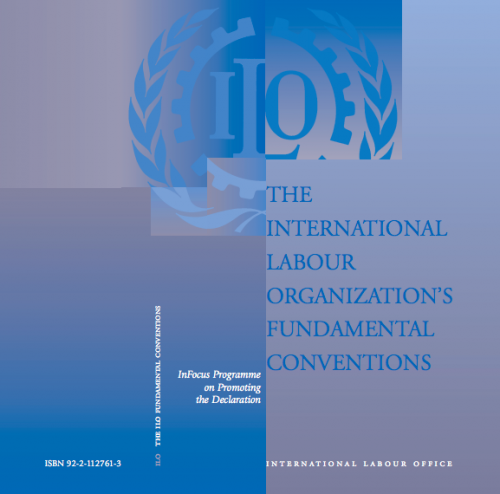 The ILO is the UN organisation responsible for setting and monitoring international labour standards. The ILO has identified eight conventions covering subjects they consider to be fundamental principles and rights at work. These are at times referred to as the core labour standards: ● Freedom of Association and Protection of the Right to Organise Convention, 1948 (No. 87) ● Right to Organise and Collective Bargaining Convention,1949 (No. 98) ● Forced Labour Convention, 1930 (No. 29) ● Abolition of Forced Labour Convention, 1957 (No. 105) ● Minimum Age Convention, 1973 (No. 138) ● Worst Forms of Child Labour Convention, 1999 (No. 182) ● Equal Remuneration Convention, 1951 (No. 100) ● Discrimination (Employment and Occupation) Convention, 1958 (No. 111)
The ILO is the UN organisation responsible for setting and monitoring international labour standards. The ILO has identified eight conventions covering subjects they consider to be fundamental principles and rights at work. These are at times referred to as the core labour standards: ● Freedom of Association and Protection of the Right to Organise Convention, 1948 (No. 87) ● Right to Organise and Collective Bargaining Convention,1949 (No. 98) ● Forced Labour Convention, 1930 (No. 29) ● Abolition of Forced Labour Convention, 1957 (No. 105) ● Minimum Age Convention, 1973 (No. 138) ● Worst Forms of Child Labour Convention, 1999 (No. 182) ● Equal Remuneration Convention, 1951 (No. 100) ● Discrimination (Employment and Occupation) Convention, 1958 (No. 111)Credit: Copyright © International Labour Organization, 2002
-
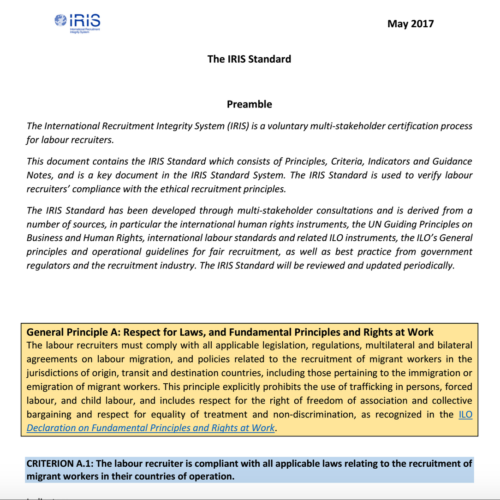 The International Recruitment Integrity System is a voluntary, multi-stakeholder certification system seeking to implement ethical recruitment standards. The Code of Conduct was established by IRIS as part of these efforts. There are 2 General Principles: Respect for Laws, and Fundamental Principles and Rights at Work Respect for Ethical and Professional Conduct It includes 5 Principles:
The International Recruitment Integrity System is a voluntary, multi-stakeholder certification system seeking to implement ethical recruitment standards. The Code of Conduct was established by IRIS as part of these efforts. There are 2 General Principles: Respect for Laws, and Fundamental Principles and Rights at Work Respect for Ethical and Professional Conduct It includes 5 Principles:- prohibition of recruitment fees to jobseekers
- respect for freedom of movement
- respect for transparency of terms and conditions of employment
- respect for confidentiality and data protection
- respect for access to remedy
Credit: International Recruitment Integrity System (IRIS)
-
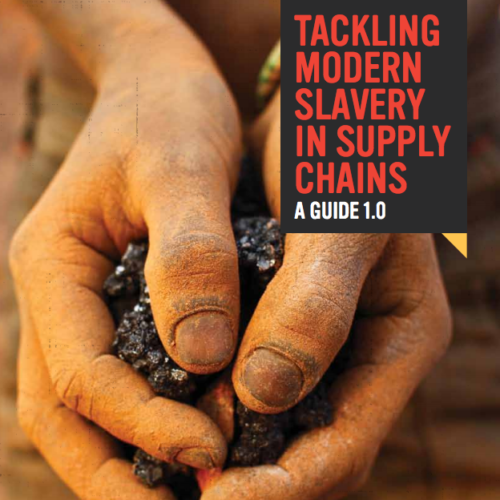 The Walk Free Foundation was established by Andrew Forrest, the Chairman of Fortescue Metals Group, after he found labour exploitation within his own supply chains and took a number of steps to prevent modern slavery affecting his business. This comprehensive guide considers corporate policy on modern slavery and provides both guidance and tools to implement it. It includes advice on corporate policy and provides template examples of a number of tools.
The Walk Free Foundation was established by Andrew Forrest, the Chairman of Fortescue Metals Group, after he found labour exploitation within his own supply chains and took a number of steps to prevent modern slavery affecting his business. This comprehensive guide considers corporate policy on modern slavery and provides both guidance and tools to implement it. It includes advice on corporate policy and provides template examples of a number of tools.Credit: Walk Free Foundation & Verite
-
 Stronger Together is a multi-stakeholder initiative which aims to reduce modern slavery. It provides guidance, training and resources to organisations, employers, labour providers, workers and their representatives. This free collection of resources includes pragmatic guidance and toolkits, and resources for the workplace including multilingual posters, leaflets and template policies. This 12 point checklist lists actions for both employers and labour providers such as corporate policy improvement, workplace awareness-raising initiatives and steps to ensure supply chain transparency.
Stronger Together is a multi-stakeholder initiative which aims to reduce modern slavery. It provides guidance, training and resources to organisations, employers, labour providers, workers and their representatives. This free collection of resources includes pragmatic guidance and toolkits, and resources for the workplace including multilingual posters, leaflets and template policies. This 12 point checklist lists actions for both employers and labour providers such as corporate policy improvement, workplace awareness-raising initiatives and steps to ensure supply chain transparency.Credit: Stronger Together

